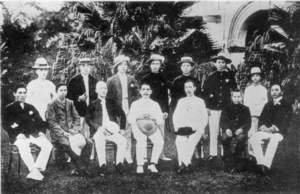- Tongmenghui
-
Tongmenghui 
Traditional Chinese 中國同盟會 Simplified Chinese 中国同盟会 Transcriptions Mandarin - Hanyu Pinyin Tóngménghuì - Wade–Giles T'ung-meng Hui Cantonese (Yue) - Jyutping zung1 gwok3 tung4 mang4 wui6 The Tongmenghui, also known as the Chinese United League, United League, Chinese Revolutionary Alliance, Chinese Alliance and United Allegiance Society, was a secret society and underground resistance movement formed when merging many Chinese revolutionary groups together by Sun Yat-sen, Song Jiaoren in Tokyo, Japan, on 20 August 1905.[1][2]
Contents
History
This new alliance was created through the unification of Sun's Xingzhonghui (Revive China Society), the Guangfuhui (Restoration Society) and many other Chinese revolutionary groups.
Among the Allegiance's members was Li Zongren, prominent Guangxi warlord and Kuomintang military commander and Wang Jingwei, who would later serve as the collaborationist President of the Executive Yuan and Chairman of the National Government in Japanese occupied China during World War II.
In 1906, a branch was formed in Singapore, following Sun's visit there; this was called the Nanyang branch and served as headquarters of the organization for Southeast Asia. After the establishment of the Republic of China, the Tongmenghui formed, in August 1912, the nucleus of Sun's new Kuomintang, which translates to National People's Party.
In Henan, some Chinese Muslims were members of the Tongmenghui.[3]
Slogan and motto
Combining republican, nationalist, and socialist objectives, in 1904 came up with the Tongmenghui political goal "to expel the Tartar barbarians, to revive Zhonghua, to establish a Republic, and to distribute land equally among the people." (驅除韃虜, 恢復中華, 創立民國, 平均地權).[2] The Three Principles of the People were created around the time of the merging of Revive China Society and the Tongmenghui.[4][5]
See also
References
- ^ "Internal Threats - The Manchu Qing Dynasty (1644-1911) - Imperial China - History - China - Asia". Countriesquest.com. http://www.countriesquest.com/asia/china/history/imperial_china/the_manchu_qing_dynasty_1644-1911/internal_threats.htm. Retrieved 2011-09-26.
- ^ a b 計秋楓, 朱慶葆. [2001] (2001). 中國近代史, Volume 1. Chinese university press. ISBN 9622019870, 9789622019874. pg 468.
- ^ Cf Allès E., 2000.
- ^ Sharman, Lyon (1968). Sun Yat-sen: His life and its meaning, a critical biography. Stanford: Stanford University Press. p. 94, 271.
- ^ Li Chien-Nung. Li Jiannong. Teng, Ssu-yu. Ingalls, Jeremy. [1956] (1956). The political history of China, 1840-1928. Stanford University Press. ISBN 0804706026, 9780804706025. pg 203-206.
External links
Categories:- History of the Republic of China
- 1905 establishments
- Xinhai Revolution
- Secret societies
- Paramilitary organizations
- Sun Yat-sen
Wikimedia Foundation. 2010.
